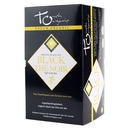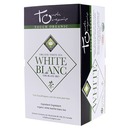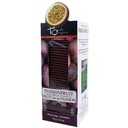Black Tea - Organic
 |
|
Commercial Description
This authentic Chinese organic black tea is recognized for its refined aroma and orchid-like flavor.
Ratings & Reviews
Page 1 of 1 page with 1 review
 60 Aroma: 6/10 Flavor: 4/5 Value: 3/5
60 Aroma: 6/10 Flavor: 4/5 Value: 3/5Difflugia (170 reviews) on Mar. 2nd, 2020
According to the box, this tea is from "Southeastern China." Fujian, maybe? The dry tea is in unbleached, individually wrapped (but not sealed) teabags. It's finely chopped and smells earthy and dusty, kind of like old books.
I'll point out first that preparing normally (one teabag in eight ounces of boiling water for four minutes) gives tea that's too weak. This has been my experience with other Chinese black teas in teabags, so I now use extra tea (three bags for sixteen ounces of water) and steep for ten minutes. That's how I've prepared it for this review.
After water is added, the tea takes on an aroma that is characteristic of inexpensive, Chinese black tea. It's mostly earthy and a little malty. The flavor is warm, round, and mellow with the barest hint of astringency and absolutely no bitterness at all, even after steeping for ten minutes. It's dark and fruity, like prunes or dried cherries without the tartness. There's also a bit of a woody flavor, like cherry bark. The flavor's got a mild sweetness that's recognizably similar to Yunnan and Keemun teas, but much less pronounced.
This tea is better than most American grocery store black teas and lacks the strong bitterness of CTC blends from Assam or Kenya. Unfortunately, it lacks the complexity and strength of comparably priced loose teas from China and it's not flavorful enough to compete with even a cheap Darjeeling from Twinings or Bigelow. It's pleasant to drink and recognizably Chinese, but it's clearly not the good stuff.
Page 1 of 1 page with 1 review



